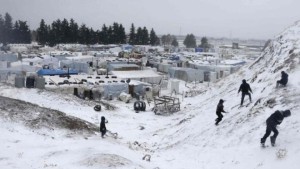South Korean lawmakers on Saturday reached an agreement to pass the North Korean human rights bill this Friday at the National Assembly plenary session.The schedule of the meeting to pass the bill, 11 years in the making, is not absolutely set, though.
What have long been the major disagreements over the bill, including the possibility of funding the leaflet-launching movement and a department in charge of archiving human rights violations in North Korea, were largely settled.
“Through the North Korean Human Rights Foundation, it is possible to fund civil organizations. However, we will only fund the organizations granted the approval of the Advisory Council on North Korea Human Rights and the Ministry of Unification (MoU),” an official from the opposition party told NK News on condition of anonymity.
The council will be formed from 10 people, five each recommended by the ruling and opposition parties.
One observer expected another round of conflict even after the bill passed.
“(There will be) conflict in the council and conflict between NGOs seeking funding,” Chris Green, Ph.D candidate at Leiden University, told NK News.
The archive will be established at the MoU, as requested by the opposition party. Some materials, however, will be moved to the Ministry of Justice.
The ruling Saenuri Party has demanded that the archive be located in the legal department in order to collect evidence of human rights abuses and punish the perpetrators after the unification.
“As the problem of human rights violations is a legal issue, which has assailants and victims … It is necessary to consider the case of West Germany’s so-called Salzgitter registry, founded in the State Judicial Administration, which worked effectively to protect the human rights of East Germans,” reads Saenuri lawmaker Shim Yoon-jo’s statement, published in November.
The MoU echoed this argument, prioritizing the improvement of human rights.
“(The argument of the opposition party means) giving up the endeavor to improve the human rights if the peace-settling process on Korean Peninsula doesn’t go well, but it is necessary to improve human rights even if inter-Korean relations don’t go well,” the MoU spokesperson told journalists on Monday.
Even though the two parties have been in agreement on passing the bill for this term since September, there has been discord over the fundamental idea surrounding the bill.
“We’ve argued for developing inter-Korean relations and human rights harmoniously,” the official from the opposition party said.
Human Rights Watch said they welcome the bill’s passage, highlighting the “determined unity in the international community” to achieve even symbolic progress.
“If this bill passes, it will mark an important milestone in South Korea for taking responsibility for ensuring that human rights issues in the North are not pushed aside for political convenience, now or in the future,” deputy director of the Asia Division Phil Robertson told NK News.
However, there may yet be delays in passing the bill. The ruling party is arguing in favor of dealing with all disputed bills – such as those on labor reform and election precincts – together on Friday, something not agreed upon by the opposition party yet.



